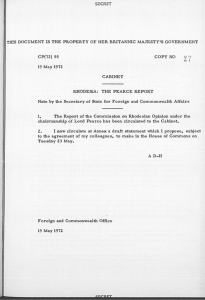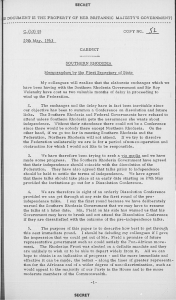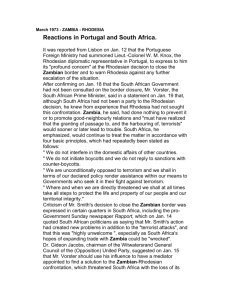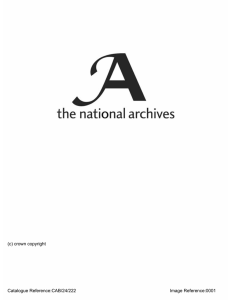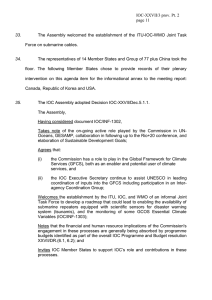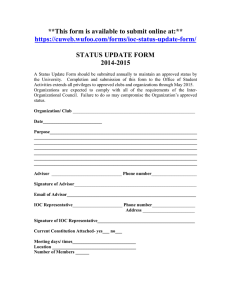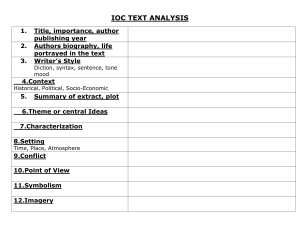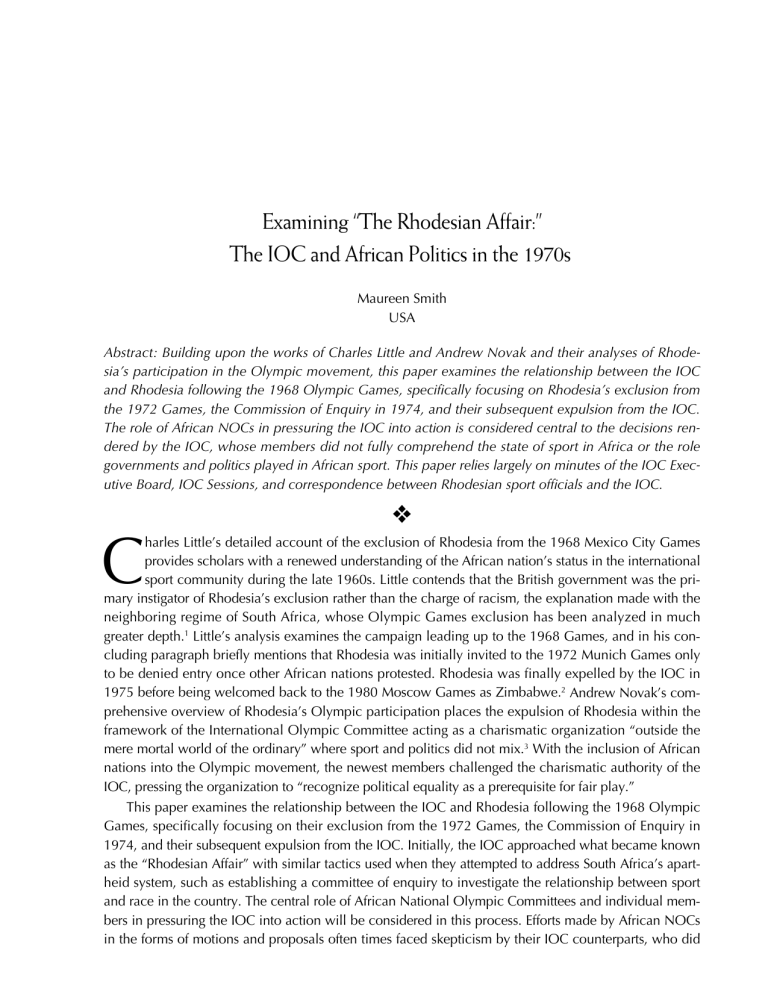
The Body Politic and the Olympic Games Maureen Smith Examining “The Rhodesian Affair:” The IOC and African Politics in the 1970s Maureen Smith USA Abstract: Building upon the works of Charles Little and Andrew Novak and their analyses of Rhodesia’s participation in the Olympic movement, this paper examines the relationship between the IOC and Rhodesia following the 1968 Olympic Games, specifically focusing on Rhodesia’s exclusion from the 1972 Games, the Commission of Enquiry in 1974, and their subsequent expulsion from the IOC. The role of African NOCs in pressuring the IOC into action is considered central to the decisions rendered by the IOC, whose members did not fully comprehend the state of sport in Africa or the role governments and politics played in African sport. This paper relies largely on minutes of the IOC Executive Board, IOC Sessions, and correspondence between Rhodesian sport officials and the IOC. ❖ C harles Little’s detailed account of the exclusion of Rhodesia from the 1968 Mexico City Games provides scholars with a renewed understanding of the African nation’s status in the international sport community during the late 1960s. Little contends that the British government was the primary instigator of Rhodesia’s exclusion rather than the charge of racism, the explanation made with the neighboring regime of South Africa, whose Olympic Games exclusion has been analyzed in much greater depth.1 Little’s analysis examines the campaign leading up to the 1968 Games, and in his concluding paragraph briefly mentions that Rhodesia was initially invited to the 1972 Munich Games only to be denied entry once other African nations protested. Rhodesia was finally expelled by the IOC in 1975 before being welcomed back to the 1980 Moscow Games as Zimbabwe.2 Andrew Novak’s comprehensive overview of Rhodesia’s Olympic participation places the expulsion of Rhodesia within the framework of the International Olympic Committee acting as a charismatic organization “outside the mere mortal world of the ordinary” where sport and politics did not mix.3 With the inclusion of African nations into the Olympic movement, the newest members challenged the charismatic authority of the IOC, pressing the organization to “recognize political equality as a prerequisite for fair play.” This paper examines the relationship between the IOC and Rhodesia following the 1968 Olympic Games, specifically focusing on their exclusion from the 1972 Games, the Commission of Enquiry in 1974, and their subsequent expulsion from the IOC. Initially, the IOC approached what became known as the “Rhodesian Affair” with similar tactics used when they attempted to address South Africa’s apartheid system, such as establishing a committee of enquiry to investigate the relationship between sport and race in the country. The central role of African National Olympic Committees and individual members in pressuring the IOC into action will be considered in this process. Efforts made by African NOCs in the forms of motions and proposals often times faced skepticism by their IOC counterparts, who did 114 Maureen Smith not fully comprehend the state of sport in Africa or the role governments and politics played in African sport. Moreover, the change in IOC presidential leadership reveals varying approaches used to address problems in African sport. This paper relies largely on minutes of the IOC Executive Board, as well as the larger membership meetings, and correspondence between Rhodesian sport officials and the IOC. Post-1968 Games At the IOC Executive Board meeting held in Dubrovnik in October 1969,4 Rhodesian delegates stated that there was no racial discrimination in sport, multiracial teams competed, any Rhodesian citizen was eligible to compete, and that the NOC was not obstructed by the Rhodesian government. The IOC countered that the case of Rhodesia was very different from South Africa, noting that when Rhodesia was under British rule, their participation was not problematic. Without British rule, however, there was no country for the Rhodesians to represent.5 At this same meeting, several African NOCs requested that the IOC verify the nationality of Rhodesian athletes, appoint a commission of inquiry, and defer any recognition of the Rhodesian NOC until the investigation is complete.6 Members voted to exclude the Rhodesian delegates from participating further in the meeting and put the item on the agenda for the Amsterdam meeting in May 1970.7 Rhodesian delegates were warned to not attend the upcoming IOC session, as their attendance would force a decision on the issue; the IOC’s approach was a delaying strategy, as long as no decision was made, the Rhodesian NOC was still considered in good standing.8 At the Amsterdam meeting in May 1970, the issue of Rhodesia was raised, with several African members participating in the discussion. However, at the same meeting, the decision was made to withdraw the recognition of the South Africa National Olympic Committee, an act that overshadowed any discussion of Rhodesia.9 President Brundage believed the Rhodesia issue to be dropped, which he considered to be a “great victory” for the African nations. In a letter to Abraham Ordia, a member of the Supreme Council for Sports in Africa and a member of the Nairobi Olympic Association, the govering body for African sports, Brundage wrote that he was convinced the charges against Rhodesia were pure politics, which had no place in sport, a belief he felt all “conservative African sport leaders” would realize. Anyone pushing the issue was “not serving the Olympic cause,” according to the President.10 Monique Berlioux, the director IOC public relations, reminded Ordia that there was no “Rhodesian problem” because there was no sign of discrimination among the athletes in Rhodesia.11 Ordia, in a letter to Brundage, stated that the IOC’s claim that the charges against Rhodesia were dropped was false, and wondered if the president was aware of the racial discrimination being practiced in the country. Believing that the issue could not be brushed aside, Ordia requested the IOC appoint a committee made up of IOC members and African NOCs, as well as the press, to investigate the nature of sport in Rhodesia.12 In Brundage’s view, Rhodesia’s NOC was fully complying with Olympic regulations.13 1972 Munich Olympic Games In September 1971, the issue of Rhodesia’s participation in the Munich Games was raised at the Executive Board and then the General Session Meeting, with several African governments threatening to withdraw their teams if Rhodesia was invited. Thirty five African NOCs had written letters to the IOC requesting an investigation into Rhodesia. A set of conditions had been established by the IOC for Rhodesia to earn an invitation to the Games and the Executive Board felt that the country met the standards, though the African NOCs disagreed. The African NOCs wanted official evidence establishing that team members representing Rhodesia were in fact Rhodesian, and not South African. There was some discussion of considering Rhodesian athletes as British subjects living in Rhodesia, which had been one of the conditions of Rhodesia’s inclusion in the 1964 Tokyo Games. The African NOCs Examining “The Rhodesian Affair:” The IOC and African Politics in the 1970s 115 believed that since Rhodesia was not recognized by other countries, there NOC should not be recognized. Brundage argued that the IOC was not interested in governments and convinced the dissenters that Rhodesia would compete under the 1964 conditions.14 Brundage agreed to send a commission of inquiry after the 1972 Games and the decision was made to invite Rhodesia to participate in the Munich events and to reconsider the issue after the Games.15 African NOCs were beginning to recognize their strength in numbers and became increasingly willing to raise issues of African politics and the role of the IOC in the development of sport in Africa. A.W.N. Green, a member of the Zambian Olympic Committee, expressed his feeling that the IOC could use its influence more effectively in the development of sport, through financial and technical assistance, as well as providing administrators and coaches.16 The Munich organizing committee had organized some pre-Olympic events for developing nations, but not all countries were included.17 Moreover, the Olympic Aid Commission was still in its early stages and were somewhat reticent in their financial support of African sport, despite the aim of the group to provide such aid to countries in need. African NOCs found support from Soviet IOC members, who had also been vocal in asking for an investigation into Rhodesian sport. Regional games, such as the proposed All-African Games, ran into obstacles from the IOC, who expressed a desire to both support African sport, but rejected the name of the games as all-African since both South Africa and Rhodesia were excluded.18 With the expulsion of South Africa still resonating, the issue of Rhodesia continued to be avoided at IOC meetings.19 The African NOCs attempted to educate the IOC on African politics, detailing in an eight page, 36 point memorandum the happenings of African independence and rebellion in Rhodesia and neighboring countries, as well as their pursuit to address the racism in Rhodesia as the IOC had grudgingly done with South Africa after tremendous African and global pressure. The African NOCs offered three recommendations: the appointment of a mixed commission of inquiry, deferring any recognition of the Rhodesian NOC until the investigation was complete, and the withdrawal of Rhodesia’s invitation to participate in the 1972 Olympics.20 At the May Executive Board meetings, the IOC agreed to send a mixed commission to Rhodesia after the Games, and maintained the agreement allowing Rhodesia to compete under the 1964 conditions.21 The African NOCSs were unhappy with the decision and arrived at the pre-Olympic session with the threat of boycotting the Games if Rhodesia were permitted to compete. The Organization of African Unity, a non-sport organization, had asked all African countries to withdraw from the Games, which caused Brundage to bristle at the intrusion of politics into the Olympics, which he felt challenged the integrity of the Olympic movement.22 A telegram from the OAU closed with “Deploring that Africa has to take such a position, we can only call your attention to the responsibility which the IOC would assume regarding the universality of the Games if the withdrawal of all Africa would become effective,” which they claimed had support of other countries who would join the boycott in support.23 In the week leading up to the Games, Ethiopia and Kenya both threatened to withdraw from the Games, causing some concern as the two countries had track and field athletes that were potential medalists and whose absence might affect the television coverage.24 At a pre-Olympic track and field meet, African American athletes refused to compete because Rhodesia’s multi-racial team was competing.25 Thus, the 73rd Session of the IOC, in the days leading up to the Games, was faced with deciding between allowing Rhodesia to participate in the 1972 Games or to support the efforts of the African NOCs threatening to boycott if Rhodesia was included. Brundage said the IOC was “faced with a very grave problem which arose unexpectedly,” that upon Rhodesia’s arrival in Munich, “to everyone’s shock and surprise, several African governments stated that if Rhodesia was to participate, they would withdraw their teams.”26 The feeling was that if the IOC gave in to the demands of the African NOCs/ 116 Maureen Smith governments, the entire Olympic movement would crumble. Brundage said, “If the IOC surrendered on this, it would be surrendering for ever and irreparable harm would have been done to the Olympic movement…If the Africans wished to go harm, then the Games would not be spoilt without them.”27 New Zealand member Lance Cross felt the “IOC was being used as a political whipping stool for people with political views who had no interest in sport. Unless the IOC took a decision to adhere strictly to its principles, then this would be the end of its independence as the parliament of sport.”28 Konstantin Andrianov of the Soviet Union thought the IOC should exclude Rhodesia “until the position returned to normal” and that it was better to sacrifice one team rather than dozens. Ethiopian member Yidnekatchew Tessema pointed out that it wasn’t just African countries against Rhodesia, but the entire world.29 Brundage and the Executive Board agreed unanimously that the Rhodesians had met the terms of agreement and invited the African delegates and Rhodesian delegates to the session. Each group was given the opportunity to argue their case. The African members reminded the IOC members that racial discrimination occurred in Rhodesian sport and that Rhodesia was exploiting the Games for their own political purposes. Still, questions related to nationality and discrimination lingered and the Rhodesians were pressed on those topics. After both sides had spoken, IOC member Segura Marte R. Gomez of Mexico pressed Brundage to find a solution that would work for both sides; Gomez felt this would be the last great act for Brundage in his presidency.30 Brundage wanted to allow Rhodesia to compete, thinking they would decline the invitation, thus allowing the other African countries to participate, but also assuring Rhodesia’s relationship with the IOC. The presidents put it before the membership as a choice between picking Rhodesia and “wrecking the Munich Games,” or support the Africans and be accused of succumbing to political blackmail.” 31 The members in attendance voted to not support Rhodesia, with 31 for, 36 against, and 3 abstentions and the invitation to Rhodesia to participate in the 1972 Games was withdrawn. 32 The vote was explained as a technicality of citizenship, not racial discrimination. Brundage took the vote personally and said it was the first time in 20-year presidency that he had asked for the confidence of the membership. He concluded that it was “obviously time for him to leave the presidency.”33 The 1972 Games were struck by terrorists who kidnapped and killed Israeli athletes, and in his speech to remember the athletes and resume the Games, Brundage mentioned the pressure applied by the African nations to exclude Rhodesia, which offended many who felt the president was somehow linking the protest of Rhodesia’s participation with terrorism, which rightly offended the African NOCs.34 Commission of Enquiry (1974) and the Vote to Expel Rhodesia (1975) Importantly, after the Munich Games, the leadership of the IOC changed hands with Lord Michael John Killanin elected president.35 Killanin had been a member of the commission of enquiry to South Africa in 1967 and it was under his presidency that it was decided to send a similar committee, comprised of three IOC members to Rhodesia to determine if Rhodesia was in compliance with IOC regulations. Despite the initial decision to send a commission, the time table was slow.36 By June 1973, three members were selected; Major Silvio de Magalhães Padilha, representing a multiracial country (Brazil), Ivar Vind, representing a non-colonizing country (Denmark), and Syed Wajid Ali, as the Asian representative (Pakistan).37 At the October meeting, Killanin reported that arrangements were being made to send the committee and he hoped they would visit the African country in June of the following year.38 He noted that FINA had recently expelled Rhodesia based on their own findings and the president urged the committee to maintain their own authority.39 There was some debate as to the makeup of the membership, with some thinking an African member should be included, and others believing the Africans would not be impartial based on their previous comments related to Rhodesia. Killanin’s feeling on the inclusion of an African member on the commission might put the African in a Examining “The Rhodesian Affair:” The IOC and African Politics in the 1970s 117 “difficult position in their own country.”40 By February 1974, the committee had still not visited Rhodesia and Canadian James Worrall replaced Vind on the committee.41 The three member commission visited Rhodesia at the end of April 1974, meeting with Ian Smith, the Prime Minister of Rhodesia, the Rhodesian NOC, officials and administrators from a variety of sports, university officials, and coaches. At the meeting of the IOC Executive Board in June, Padilha presented a provisional report on their investigation and concluded that the committee on their visit “came across complete contradictions.” Their notes reveal that “multiracial sport was a fallacy” according to Africans, and even Prime Minister Smith admitted there was “some racial discrimination” in Rhodesia. According to others interviewed by the commission, Rhodesian sport was a multiracial example for the rest of the country to emulate.42 Worrall was still writing the final report, which they hoped would be ready for distribution shortly.43 Four months later, at the 75th Session of the IOC in Vienna, the committee’s report was still not ready for the membership.44 Africans took the opportunity for the delay to call for an increase in African membership and pointing out that the IOC “did not make enough use of its African members.” One member said the IOC seemed more like the European Olympic Committee. Another reminded the membership that there was still considerable bitterness that an African member was not part of the commission of inquiry.45 In February 1975, years after the first request for a commission of inquiry into Rhodesian sport, the commission distributed their findings to the Rhodesian NOC and the IOC Executive Board.46 The report confirmed that racial discrimination did occur in Rhodesian sport. At a meeting of the Rhodesian NOC, Stuart was “pleased to report that as a result of strong action by the Executive Committee of the sports concerned practically every club in Rhodesia have amended their Constitution to do away with this discrimination in Sporting Clubs.” Moreover, he reminded them of the catastrophe that had occurred in Munich and said he wanted assurances from the IOC about the upcoming Montreal Games in 1976.47 Lord David Burghley, a member from the United Kingdom, in a letter to Killanin, took issue with some of the report’s findings, and thought “there (were) potentially some very tricky points that may be brought out of it, particularly by those who are determined for political reasons to clobber Rhodesia at any cost!” He thought the membership of schools was “fraught with difficulties,” as was the access to facilities.48 The Rhodesian NOC rebutted some of the commission’s findings and asked the IOC to investigate other African NOCs on similar charges.49 It was decided that at the 76th IOC Session held in May, both the Rhodesian NOC and the African delegates would have the opportunity to present their cases and then a vote on Rhodesia’s recognition would be taken.50 The African delegates, with the support of the SCSA, argued that discrimination occurred in Rhodesian sport and that the nation caused great embarrassment for other African nations. They urged the IOC to withdraw their recognition of Rhodesia’s NOC. Rhodesian delegates countered that the commission’s report refuted the complaints from African NOCs and pointed out that Rhodesia had responded to the report by making changes in their constitution and rules. Killanin recommended the membership suspend rather than expel Rhodesia for their violations of the Olympic Charter, and the membership voted 41 to 26 to withdraw their recognition of the Rhodesian Olympic Committee.51 A week later, Killanin sent R.W. Grant Stuart, president of the Rhodesia NOC, a letter confirming the expulsion of Rhodesia from the IOC, citing the inability of the Rhodesian NOC to comply with Rule 25 and the fundamental principles of the Olympic movement “owing to the Government legislation.”52 Killanin closed his letter with the hope that the situation could be resolved “as there is nothing the International Olympic Committee likes doing less than withdrawing recognition.” 53 Stuart replied telling Killanin that the expulsion was a “very sad blow to Rhodesian Sportsmen and Sportswomen” and set the country back at least ten years. It was Stuart’s opinion, and one he thought was shared by other IOC members, that the “move to exclude Rhodesia was quite definitely politically motivated.” It was a great disappointment to him that “such a 118 Maureen Smith body of men, whilst professing to observe and encourage the Olympic ideals. Could act against the very basic principals (sic) of the Olympic movement.”54 Prior to the 1976 Montreal Olympic Games, there was some discussion as to revisiting the issue of recognizing the NOC of Rhodesia.55 However, much like an earlier meeting where Rhodesia was overshadowed by the decision to expel South Africa, the lead up to the 1976 Games were dominated by the threatened boycott of the African NOCs, this time over the inclusion of New Zealand, who they felt should be excluded because of their recent sporting ties with South African rugby.56 The success of the African nations in their ban on Rhodesia four years prior served as evidence of their power.57 However, the IOC determined that since rugby was not an Olympic sport, the African nations protest had little merit. It was decided that New Zealand would be allowed to participate, which resulted in the withdrawal of 33 African nations.58 The practice of apartheid in South Africa and the racist regime of Rhodesia increasingly garnered more global attention and eventually the IOC seemed to fall in line in their disapproval of the practice of racial discrimination in sport.59 Throughout 1978, Killanin and other IOC officials exchanged a number of letters with Rhodesian sport delegates related to the recognition of the Rhodesian NOC. As the politics of the Rhodesian government shifted and appeared to be heading toward a resolution, R.W. Grant Stuart, in late January, asked Killanin restore the nation’s membership in light of the Rhodesian government was “now firmly committed to a policy of majority rule by universal suffrage.”60 Killanin felt any decision regarding the Rhodesian NOC was “premature in view of the unfortunate political situation which exists.”61 Stuart wrote a second letter on the same day protesting an article in Olympic Review, which he felt was a “malicious misrepresentation of the true facts.”62 The IOC’s slow response to Stuart’s concern related to the Olympic Review prompted him to write another letter of protest related to the article, which he claimed promoted “ill-feeling against Rhodesia.” He thought it “unfortunate that the basic principles of the founder of the Olympic movement seem to be fading into the background in the wake of forceful and bitter political aspirations.”63 He continued to make the point that Rhodesia was “well on its way to universal suffrage.”64 The Rhodesian felt that “there would be no better way for the IOC to prove its own belief in the Olympic principles than to invite them back into membership of the IOC.” 65 In response to Stuart’s concerns and requests for Rhodesian recognition, the IOC was clear. Killanin stated that he was “watching the situation in Rhodesia and Zimbabwe with the closest attention.”66 Berlioux, by this time the secretary-general of the IOC, echoed Killanin’s letter, replying to Stuart that the “IOC cannot change its policy vis-a-vis Zimbabwe-Rhodesia as long as it is not convinced by actual facts that any racial discrimination in sport has disappeared in your country.” She closed with the hope that a time would come when a Zimbabwe-Rhodesia NOC could be recognized.67 A year later, Stuart wrote to the IOC reporting that “All discriminatory legislation has now been abolished, and a new constitution has been accepted” in his country. Stuart submitted that “if the International Olympic Committee is not to lay itself open to participation in politics, it must now surely extend an invitation to the National Olympic Committee of Rhodesia be re-admitted as a full and active member.”68 Only weeks before the 1980 Moscow Games, Zimbabwe, formerly known as Rhodesia, was invited to attend. Conclusions Novak posits that the decision to exclude Rhodesia ultimately benefitted the Olympic movement. He saw the IOC as acting “against its long-held charismatic principles in favour of a democratic majority” and challenging their “imperial vision in a post-imperial era.”69 This paper argues instead that African members were central figures in the shifts in IOC politics as the sport organization expanded into developing countries and subsequently had to address the politics of these newly independent states who were working to create their own post-colonial identities. European IOC members were not sud- Examining “The Rhodesian Affair:” The IOC and African Politics in the 1970s 119 denly aware of racial discrimination; in fact, many of them did not believe it even existed. However, by this time, the African members were too valuable to risk losing, whether in the form of medal performing athletes who would attract television coverage, connections with global organizations that were pressuring the rest of the world related to apartheid and racism, or simply the IOC’s own claim to be the leader in international sport, which meant they needed to have members that represented the globe. After the decision to withdraw the invitation to Rhodesia in 1972, New York Times reporter Neil Amdur believed the decision to withdraw Rhodesia’s invitation to the 1972 Games “represented the most significant show of strength for the African nations since they began joining the Olympic movement” and believed “a sense of unity that is likely to increase as black nationalism begins to asset itself politically on the African continent.”70 Perhaps one example of this is in the writing of Ganga, who wrote, “Our struggle against the NOCs of racialist countries comes under the noble ideals of Olympism which we made our own when we joined the International Olympic movement.”71 Ironically, the newly independent African nations sought inclusion in the imperial IOC, and used the language of the IOC to help oust both South Africa and Rhodesia from the Olympic movement. The solidarity of the African nations leading up to the 1972 Games and their effective campaign to ban Rhodesia from those Games and subsequent expulsion three years later serve as powerful evidence of both the desire of the IOC to extend their own imperialism into the African continent, while simultaneously revealing the collective force of independent African countries working to exert their new place at the international sporting table. Endnotes 1 See Douglas Booth, The Race Game: Sport and Politics in South Africa (London: Frank Cass, 1998); Robert Archer and Antoine Bouillon, The South African Games: Sport and Racism (London: Zed Press, 1982). 2 Charles Little, Preventing ‘A Wonderful Break-Through for Rhodesia’: The British Government and the Exclusion of Rhodesia from the 1968 Mexico Olympics, OLYMPIKA: The International Journal of Olympic Studies XIV (2005), 47-68; Also see Andrew Novak, Rhodesia’s ‘Rebel and Racist’ Olympic Team: Athletic Glory, National Legitimacy and the Clash of Politics and Sport, The International Journal of the History of Sport 23, no. 8 (2006), 1375-1377; Boycott of Olympics Approved by 32-Nation African Council, New York Times, February 27, 1968. 3 Novak, Rhodesia’s ‘Rebel and Racist’ Olympic Team, 1371. 4 Prior to the 1968 Olympic Games, there was debate among IOC members about the intrusion of politics into the Olympic arena, specifically that United Nation sanctions on Rhodesia was creating questions as to the appropriateness of the country’s participation in the Games. According to the letters, the IOC members were resentful and annoyed that world politics were trumping their competition. For example, Avery Brundage, letter to J.W. Westerhof, 10 June 1968, Olympic Studies Centre, Lausanne, Switzerland (which will be referred to as IOC in remainder of endnotes), where he “deeply deplored” that the Rhodesians would not be able to participate because of the U.N., who were interfering. In another letter to Westerhof, 24 June 1968, Lord David Burghley states that there is no segregation in Rhodesian sport and that the IOC is not connected to the United Nations. Brundage even sent a letter to the Rhodesian NOC on 13 July 1968 stating that as far as the IOC was concerned, the NOC was in good standing and entitled to participate in the upcoming Mexico City Games. 5 Southern Rhodesia declared their independence from Britain in November 1965. This “unilateral declaration of independence,” or U.D.I., resulted in Prime Minister Ian Smith ruling the “independent” nation. This independence occurred at a time when other African nations were becoming independent from their colonial ties; however, in the case of Rhodesia, a white minority ruled the Black majority in the new country. Eventually, Rhodesia became Zimbabwe, an independent African nation in 1980. See Robert C. Good, UDI: The International Politics of the Rhodesian Rebellion (Princeton University Press, 1973); Ian Hancock, White Liberal Moderates and Radicals in Rhodesia, 1953-1980 (NY: St. Martin’s Press, 1984); Patrick O’Meara, Rhodesia: Racial Conflict or Coexistence? (Ithaca, NY: Cornell University Press, 1975); Harry R. Strack, Sanctions: The Case of Rhodesia (Syracuse, NY: Syracuse University Press, 1978); Lawrence 120 Maureen Smith Vambe, From Rhodesia to Zimbabwe (Pittsburgh: University of Pittsburgh Press, 1976); Anthony Verrier, The Road to Zimbabwe, 1890-1980 (London: Jonathan Cape Ltd, 1986). 6 Resolution on the Problem of Rhodesia, 23 October 1969. Rhodesia File, IOC. 7 Minutes of the IOC Executive Board, Dubrovnik, 23-27 October 1969. Also see A.D. Butler, letter to President, PGA of NOCs, 21 October 1969, which notes their exclusion from Dubrovnik meetings. 8 Monique Berlioux, letter to G.O. Plaskitt, 28 April 1970, Rhodesia File, IOC; “May I give you a personal and confidential advice: don’t come. The reasons are, if you come, you will be heard by the Executive Board or the full session and the latter will have to take a decision concerning your NOC. If you are not coming the decision will have to be postponed, because no decision can be taken without hearing the persons accused.” 9 Minutes of the 70th Session of the IOC, Amsterdam, 12-16 May, 1970, Item 23, pp. 26-29. In Annex 19, language was proposed to address discrimination within the rules of the IOC, with new inclusions to be written into Rules 24 and 25. See pp. 71-72. 10 Avery Brundage, letter to A.A. Ordia, 15 April 1971, IOC. 11 Monique Berlioux, letter to A.A. Ordia, 18 May 1971, IOC. 12 A.A. Ordia, letter to President Brundage, 22 May 1971, IOC. 13 Avery Brundage, letter to President A.D. Touny, Olympic Committee of the United Arab Republic, 29 May 1971, IOC. 14 Minutes of the 71st Session of the IOC, Luxemburg, 15-17 September 1971, Item 8, p. 16. For an example of a letter from an African NOC requesting an investigation, see A.W.N. Green, NOC of Zambia, letter to Avery Brundage, 25 August 1971, IOC. 15 Minutes of the 71st Session of the IOC, Luxemburg, 15-17 September 1971, Item 8, p. 17; Novak’s discussion of Rhodesia’s participation in the 1972 Games is addressed in pp. 1378-1382. 16 A.W.N. Green, Zambian Olympic Committee, letter to Technical Director of IOC, 17 November 1971, IOC. 17 Minutes of the 72nd Session of the IOC, Sapporo, Jan. 31- Feb. 1, 1972, item 7, p. 18. 18 Minutes of the 72nd Session of the IOC, Sapporo, Jan. 31- Feb. 1, 1972, item 17, p. 38. 19 Minutes of the IOC Executive Board Meetings, Tokyo, 28 January 1972; Sapporo, 29 January – 1 February 1972; Minutes of the 72nd Session of the IOC, Sapporo, Jan. 31- Feb. 1, 1972. 20 Memorandum submitted to the IOC on the recognition of the Rhodesian NOC and its participation in the Olympic Games in Munich, no date, Rhodesia File, IOC. 21 Minutes of the Executive Board Meetings, Lausanne, 27-30 May 1972, item 14. Despite the decision to send a commission, it was decided again to send a commission at the August 1972 meetings. This commission would be comprised of Black and White IOC members. See A Mission to Rhodesia Set, New York Times, August 21, 1972. 22 Minutes of the Executive Board Meetings, Munich, 18-22 August, 1, 6-8, 10-11 September 1972, p. 20. 23 OAU, telegram to Avery Brundage, during 73rd Session, August 1972, IOC. 24 Neil Amdur, Kenya Threatens to Boycott Olympics if Rhodesia is Allowed to Compete, New York Times, August 17, 1972; also see Neil Amdur, Ethiopia Pulls Team out of Olympics, Acts in Protest of Rhodesia’s Participation, New York Times, August 16, 1972; this article also notes the withdrawal of Tanzania, Sierra Leone, Liberia, Guyana, and Sudan. Also see Neil Amdur, Race Relations Crisis Poses Serious Threat to Olympic Games, New York Times, August 20, 1972; Nigeria Declines to Quit Olympics, but Uganda and Mali Join the Protest Movement, New York Times, August 18, 1972. 25 Blacks Quit German Track Meet Over Rhodesia Issues, New York Times, August 20, 1972; African American athletes were concerned with the inclusion of Rhodesia in the Games and submitted a letter of appeal to the IOC; see Appeal by U.S. Athletes, New York Times, August 21, 1972. 26 Minutes of the 73rd Session of the IOC, Munich, 21-24 August, 1972, item 6, Political interference – Rhodesia, p. 8. 27 Ibid., 11. 28 Ibid., 12. 29 Ibid., 10. For another account of Africa’s Olympic trials and tribulations, see letters from Ethiopian member Y. Tessema to Lord Killanin at http://www.tessemas.net/Reforming%20the%20SCSA.HTM. As the author of the website is unknown, it is difficult to determine the accuracy of the narrative accompanying the letter. Still, the letter does provide additional points to consider in the relationship between Africa and the IOC. 30 Minutes of the 73rd Session of the IOC, Munich, 21-24 August, 1972, item 6, p. 17. 31 Ibid. 32 Ibid. Also see Neil Amdur, Rhodesia Out of Olympics After a Dispute on Racism, Rhodesia is Ousted from Olympics Barred 36-31 Vote over her Racial Policy, New York Times, August 23, 1972. Examining “The Rhodesian Affair:” The IOC and African Politics in the 1970s 121 33 Minutes of the 73rd Session of the IOC, Munich, 21-24 August, 1972, item 6, p. 18. For an account of Brundage’s presidency during this period, see Allen Guttmann, The Games Must Go On: Avery Brundage and the Olympic Movement (NY: Columbia University Press, 1984). Chapter 14, Dealing with the Third World, 223-255, addresses Brundage’s dealings with the development of African nations in the Olympic movement, as well as issues with South Africa and Rhodesia. 34 At least one African member felt the Rhodesian Affair had occurred as a result of politics intrusion in sport and merited investigation. However, this member was Reginald Honey, the member from South Africa, who was expelled from the Olympic Games. See Reginald Honey, Report, accompanied by letter to Hugh Weir, 3 October 1972; In handwriting, dated 24 January 1974 – Honey wrote on the letter, “These remarks may cause some embarrassment, but I was asked for my view and have given it.” 35 Neil Amdur, Irish Lord New Olympic Chief, New York Times, August 24, 1972. This article mentions a seven page “manifesto” written by the African members that detailed the political effects and solidarity of their “victory.” For Killanin’s account of his presidency, see Lord Killanin, My Olympic Years (NY: William Morrow and Company, Inc, 1983). Killanin addresses the development of African sport in Chapter 9, UNESCO and the Third World, 71-77. 36 Despite the February 1973 decision to send a commission, Killanin felt it would be better to delay any action, and suggested the commission wait until the end of the year or early 1974 to see how the situation was progressing. See Minutes of the IOC Executive Board, Lausanne, 2-5 February 1973. 37 Minutes of the IOC Executive Board, Lausanne, 22-24 June 1973, p. 24; Minutes of the 74th Session of the IOC, Varna, 5-7 October 1973. 38 Minutes of the IOC Executive Board, Varna, 29-30 September, 2 October 1973, No. 6 – NOCs, b/special cases – Rhodesia, p. 8. 39 Minutes of the 74th Session of the IOC, Varna, 5-7 October 1973, Commission of Enquiry to Rhodesia, p. 22. Kenyan representative Reginald Alexander thought the IOC would be ridiculed if their findings differed from FINA. For more on the FINA ruling, see FINA Resolution, 30 August 1973, which “Rhodesia Amateur Swimming Association be expelled from the FINA until such time that they can provide proof that the sport of swimming is integrated,” Rhodesia File, IOC. Also see Rhodesia uproar over bar on multiracial swimming ban, The Times (London), January 25, 1974. . 40 Minutes of the 74th Session of the IOC, Varna, 5-7 October 1973, Commission of Enquiry to Rhodesia, p. 22. 41 Minutes of the IOC Executive Board, Lausanne, 9-11 February 1974, 1. Enquiry for Rhodesia, p. 9. 42 Notes of the Meeting of the Commission of Enquiry for Rhodesia. 28 April – 5 May 1974, Rhodesia File, IOC. After their visit, the commission members decided they should identify the race of each person interviewed, but in reading their notes, the only individuals whose race was identified were Asians and Africans, leaving one to assume that if race was not noted the individual was White. 43 Minutes of the IOC Executive Board, Lausanne, 1-3 June 1974, 8k, p. 8. Also see Annex 5. For Novak’s overview of this period, see pp. 1382-1383. 44 Minutes of the 75th Session of the IOC, Vienna, 21-24 October 1974, item 11 – Reports of the Commissions, Enquiry for Rhodesia, p. 18. 45 Minutes of the IOC Executive Board, Vienna, 18-24 October 1974, pp. 14 -15. 46 Minutes of the IOC Executive Board, Lausanne, 20-22 February 1975. It was again pointed out that no African member served on the commission. Worrall reminded the membership that the report was on facts, it was not making recommendations. Killanin said the report would be discussed at the next meeting scheduled for May in Lausanne. The Rhodesians would be invited to this meeting. See Commission report and attachments. 47 Minutes of the NOC of Rhodesia, 16 February 1975, p. 2. There were some disagreements with the commission’s findings. See S.O. O’Donnell, Secretary for Foreign Affairs, letter to NOC of Rhodesia, 15 April 1975, IOC files. This letter details inaccuracies in the Commission of Enquiry for Rhodesia report. 48 Lord David Burghley, letter to Lord Killanin, 8 March 1975, IOC. 49 Reply by the NOC of Rhodesia to the charges submitted to the IOC by some of the NOCs of Africa, IOC files. 50 Minutes of the IOC Executive Board, Lausanne, Rome, 14-16 May, Lausanne, 19, 23 May 1975, 11. NOCs, c/Rhodesia, p. 19. Since the vote had not yet been taken, Killanin thought it premature to issue an invitation to Rhodesia for the Montreal Games; see p. 25. 51 Minutes of the 76th Session of the IOC, Lausanne, 21-23 May 1975, Report on the Rhodesian National Olympic Committee, p. 23; Annex 15 – Mr. Ordia’s speech on Rhodesia. p. 54; Annex 16 – Charges submitted to the IOC Against the National Olympic Committee of Rhodesia for its Exclusion from the International Olympic Committee, pp. 55-57; Annex 17 – Reply by the National Olympic Committee of Rhodesia to the Charges Submitted to the International Olympic Committee by some of the NOCs of Africa, pp. 57-64. Also see Novak, p. 1383. 52 Lord Killanin, letter R.W. Grant Stuart, 29 May 1975, IOC; the letter confirms the expulsion of Rhodesia from IOC. 122 53 Ibid. 54 R.W. Grant Stuart, letter to Lord Killanin, 20 June 1975, IOC; the letter is Stuart’s reaction to Rhodesia’s expulsion from the IOC. 55 R.W. Grant Stuart, letter to Lord Killanin, 23 February 1976, IOC. 56 For one member’s version of the New Zealand – African NOC dispute, see Lance Cross, letter to Lord Killanin, 1976, IOC. Cross wrote “the Rhodesian Affair seemed to have little to do with racism in sport, since Rhodesia had entered a multi-racial team, but that the boycott was politically motivated….I have been by Mr. Ordia on many occasions of being New Zealand’s leading pro-apartheid supporter…just as I have stated that while I abhor discrimination, I believe, as do most New Zealanders, including the Government, that we can help remedy the situation which exists in South Africa and in some other places as well, by building bridges through continued communication which is the only means of negotiation…” Rhodesia continued to face sanctions for the racism in their country and sport organizations, and a commission of inquiry into Rhodesian society (absent of any investigation of sport) was conducted by an eleven person committee established by the Prime Minister. See Report of the Commission of Inquiry into Racial Discrimination 1976 (dated 23 April 1976), Prime Minister’s Office, IOC. The commission was made up of 11 members and did not investigate sport. The commission issued an eight chapter report (Land Tenure Act, Electoral Law, Education System, Opportunities for Employment, Rhodesian Railways, Certain Disabilities Suffered by African Women, Declaration of Rights, Miscellaneous). Also see Tony Kornheiser, Africa Threat Casts a Cloud on Olympics, New York Times, May 23, 1976. 57 Neil Amdur, Are Political Influences on Sports Inescapable? New York Times, July 14, 1976. 58 Minutes of the IOC Executive Board, Lausanne, Montreal, 10-12, 15-16, 19-27, 29-31 July 1976, Annex 30 – African Withdrawal from the Games. Algeria, Cameroon, People’s Republic of Congo, Ethiopia, Ghana, Guyana, Upper Volta, Iraq, Kenya, Libya, Mali, Niger, Nigeria, Uganda, Swaziland, Chad, Togo, Zambia, Arab Republic of Egypt, Morocco, Sudan, Tunisia, Central Africa, Malawi, Gambia, Gabon, Madagascar, Tanzania, Zaire. Also see Minutes of the 78th Session of the IOC, 13-17 July 1976, Annex 8, p. 70; Annex 10, p. 71. Also see Steve Cady, Taiwan, Nigeria Quit Olympics; More Withdrawals Threatened, New York Times, July 17, 1976; Novak, Rhodesia’s ‘Rebel and Racist’ Olympic Team, 1373. 59 One example of another organization’s response to racism is Commonwealth statement on apartheid in sport, 15 June 1977, IOC. The document recognized that “racial prejudice and discrimination as a dangerous sickness and an unmitigated evil” and “reaffirmed that apartheid in sports…is an abomination and runs directly counter to the Declaration of Commonwealth Principles.” 60 R.W. Grant Stuart, letter to IOC President, 28 January 1978, IOC. 61 Lord Killanin, letter to R.W. Grant Stuart, 7 February 1978, IOC. 62 R.W. Grant Stuart, letter to IOC President, 28 January 1978, IOC. The article he was responding to was Jean-Claude Ganga, The Development of African Sport, Olympic Review, no. 119, September 1977, 551-553. Ganga provides an overview of African sport and notes the impact of colonization and independence on the development of African sport. 63 R.W. Grant Stuart, letter to Madame Monique Berlioux, 10 March 1978, IOC. Parts of this letter were included in the Readers Correspondence section of Olympic Review. 64 R.W. Grant Stuart, letter to IOC President, 10 March 1978, IOC. 65 Ibid. 66 Lord Killanin, letter to R.W. Grant Stuart, 20 March 1978, IOC. 67 Monique Berlioux, letter to R.W. Grant Stuart, 26 March 1978, IOC. 68 R.W. Grant Stuart, letter to Lord Killanin, 12 March 1979, IOC. 69 Novak, Rhodesia’s ‘Rebel and Racist’ Olympic Team, 1383. 70 Amdur, Rhodesia Out of Olympics. 71 Ganga, The Development of African Sport, 551.
